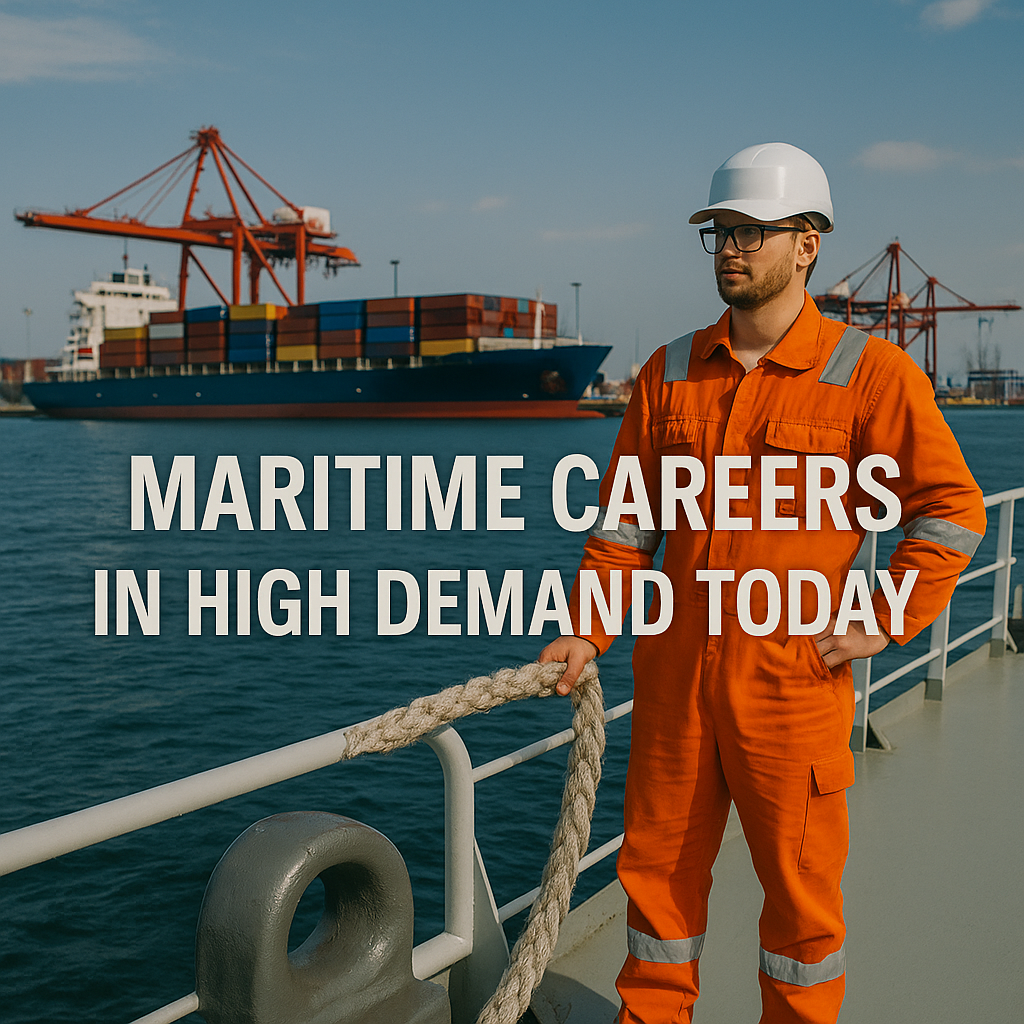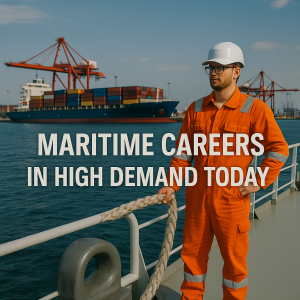Explore the top 10 maritime careers in high demand today. Discover opportunities, required skills, and real-world insights shaping the future of seafaring professions.”
Why Maritime Careers Matter in the Modern World
The maritime industry is the lifeblood of global trade—over 90% of world commerce travels by sea. From commercial shipping to offshore energy and marine research, maritime careers are more crucial than ever. As global logistics evolve and sustainability becomes central, maritime professionals are in high demand to meet both current and future challenges.
Whether you’re a student considering a seafaring life, a seasoned mariner seeking advancement, or an enthusiast curious about the world of maritime employment, understanding today’s most sought-after roles is essential.
According to the International Maritime Organization (IMO), demand for certified officers and skilled crew is projected to grow by over 24% by 2030. Add to that new roles emerging from technological innovation and climate initiatives, and the sector becomes not only vital but vibrant with opportunity.
The Top 10 Maritime Careers in High Demand
1. Marine Engineer
Marine engineers are the backbone of any vessel’s operations. They ensure propulsion systems, auxiliary machinery, and fuel management systems operate safely and efficiently. With a global push for greener engines and energy efficiency, the role has evolved beyond mechanical oversight.
Real-World Example: In 2022, Maersk launched its first methanol-powered container ship. Engineers trained in dual-fuel systems were essential for its operation.
2. Deck Officer (Navigation Officer)
Deck officers, particularly Second and Chief Mates, are in high demand due to their navigation expertise and ability to manage large crews and cargo operations. Digital navigation systems and Electronic Chart Display and Information Systems (ECDIS) proficiency are increasingly critical.
Did You Know? The IMO requires mandatory ECDIS training for deck officers under STCW (Standards of Training, Certification and Watchkeeping).
3. Maritime Cybersecurity Specialist
As ships become “smarter” with integrated software systems, cybersecurity has moved to the forefront. This career path is emerging as a must-have aboard high-tech fleets and in shipping company HQs.
Statistic: According to the International Chamber of Shipping (ICS), cyberattacks on maritime systems increased by 400% between 2020 and 2023.
4. Port Operations Manager
Ports are no longer just concrete loading zones—they are logistical nerve centers. Port operations managers coordinate cargo flow, terminal equipment, and customs compliance. With the rise of smart ports, this role is becoming increasingly tech-driven.
Case Study: Rotterdam Port’s automation system reduced container dwell time by 30%, thanks to skilled operations managers and tech specialists.
5. Ship Surveyor / Marine Surveyor
Marine surveyors inspect vessels to ensure compliance with safety, environmental, and regulatory standards. They often work with classification societies like Lloyd’s Register or DNV.
Fun Fact: Becoming a marine surveyor often requires a background as a chief engineer or master mariner, along with certification from bodies like IIMS or ABS.
6. Environmental Compliance Officer (ECO)
With stricter environmental regulations like IMO 2020 sulfur cap and upcoming carbon intensity rules, ECOs are indispensable.
They monitor emissions, waste management, and ballast water treatment, ensuring vessels meet MARPOL standards.
Example: The Ballast Water Management Convention (2017) created an urgent demand for onboard environmental specialists.
7. Dynamic Positioning (DP) Operator
Used extensively in offshore drilling, subsea cable laying, and wind farm installation, DP operators control vessel position using satellite and thruster systems.
Training Tip: DP operators need certification from institutions like The Nautical Institute. Offshore companies often require Level 1 and Level 2 certification with logged sea time.
8. Maritime Lawyer
Shipping law is a complex arena, covering everything from international trade disputes to environmental claims. As regulations increase, legal expertise is in high demand.
Emerging Trend: There is a rising need for legal experts specializing in decarbonization compliance and maritime cybersecurity liabilities.
9. Hydrographic Surveyor
These professionals use sonar, radar, and GPS to map the seafloor—vital for safe navigation, port construction, and offshore exploration.
Application: Hydrographers play a key role in wind farm projects by conducting pre-installation seabed surveys.
10. Cruise Ship Hospitality Manager
As cruise tourism rebounds post-COVID, demand for skilled hospitality professionals onboard is booming. This includes culinary experts, hotel operations, and entertainment coordinators.
Statistic: The Cruise Lines International Association (CLIA) predicts passenger numbers will exceed pre-pandemic levels by 2026, requiring thousands of onboard staff.
The Driving Forces Behind Maritime Career Demand
Technological Innovation
Automation, AI-driven logistics, and green propulsion systems are creating hybrid technical-managerial roles never seen before in the maritime world.
Global Trade Recovery
Post-pandemic trade surges and geopolitical shifts have increased cargo volumes, requiring more crew and logistical oversight.
Environmental Regulation
Regulatory bodies like the IMO and EU ETS are enforcing sustainability benchmarks, creating new compliance-focused careers.
Challenges and Solutions
Challenge: Skilled Labor Shortage
Many developed nations report an aging workforce, while training facilities struggle to keep up with demand.
Solution: Global recruitment, cadetship programs, and online certifications (e.g., through IMO e-learning) are helping to fill the gap.
Challenge: Safety and Cyber Threats
Modern ships face both physical and digital dangers.
Solution: Investment in cybersecurity training and stricter STCW safety protocols.
Future Outlook: What’s on the Horizon?
-
Green Shipping: Careers in alternative fuel management (e.g., ammonia, LNG) will surge.
-
Offshore Wind Expansion: Installation and maintenance roles in offshore energy are rapidly growing.
-
Digital Ship Management: Remote operations and digital twins will demand new IT-marine hybrid skillsets.
Frequently Asked Questions (FAQ)
Q1: What’s the best maritime career for job stability?
A: Marine engineering and ship operations (like chief mates) offer high job stability due to consistent global demand.
Q2: How do I become a DP operator?
A: You must undergo DP training from a certified provider and log sea time to earn certification.
Q3: Are maritime careers suitable for women?
A: Absolutely. Organizations like WISTA and IMO promote gender equality and offer scholarships for women in maritime.
Q4: Can I work in maritime without going to sea?
A: Yes. Port logistics, maritime law, marine insurance, and training roles are all shore-based.
Q5: How much do marine engineers earn?
A: Salaries vary, but senior engineers can earn between $6,000 to $12,000 per month on deep-sea vessels.
Q6: Do I need a degree to join the maritime sector?
A: Not always. Many roles begin with vocational training or maritime academy certifications.
Q7: Is AI threatening maritime jobs?
A: AI is reshaping roles but also creating new opportunities in automation, maintenance analytics, and remote navigation.
Conclusion
The maritime industry is undergoing a profound transformation—driven by digitalization, sustainability, and globalization. Whether on the bridge, in the engine room, or ashore, the need for skilled maritime professionals has never been greater.
From traditional roles like marine engineering to modern niches like cybersecurity, today’s maritime careers offer adventure, stability, and growth. If you’re looking to embark on a rewarding journey, now is the time to set sail.
Explore more about maritime certifications and job listings on MaritimEducation.com.
References
-
International Maritime Organization. (2023). Global Maritime Training Insights. Retrieved from https://www.imo.org
-
International Chamber of Shipping. (2024). Cybersecurity Guidelines for Ships. https://www.ics-shipping.org
-
Cruise Lines International Association. (2024). State of the Cruise Industry Outlook. https://cruising.org
-
The Nautical Institute. (2024). Dynamic Positioning Training Scheme. https://www.nautinst.org
-
World Maritime University. (2023). Women in Maritime Research Report. https://www.wmu.se



